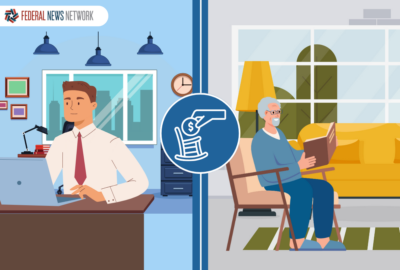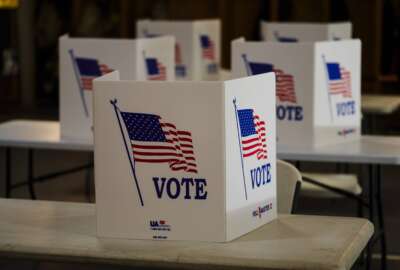Young adults don’t trust federal government, deepening its hiring challenges
New research shows young adults trust the federal government less than any other demographic, adding to its hiring challenges.
When Yaneeka Nichols graduates from Syracuse University with a bachelor’s degree in information management and technology, she wants a job at Apple, working on user interface and product design challenges.
Nichols said she’s looked into tech jobs in the federal government. But a recent visit to an IRS facility, and a meeting with the tech team working there, didn’t change her career goals.
A private-sector tech company, she said, would give her freedom that she can’t get from the federal government.
“I want to be someone who takes technology in a whole new direction,” Nichols said at a Partnership for Public Service event last Thursday. “Working within the private sector, such as Apple, Tesla, Microsoft … you’re free to do what you need to do with your job, under their rules and regulations.”
Being a federal employee, she added, also adds a whole new level of scrutiny: You answer to the American public, not just your boss.
“You don’t work only for your sector. You’re working for the public. You’re working for the people. Keeping that in mind, you must understand everything you do, the decisions you make, it all comes back to not only your sector, your job,” Nichols said.
Agencies across the federal government are looking for candidates like Nichols to consider a career in public service.
Since last year, they’ve been participating in several “Tech to Gov” hiring fairs, to recruit the next generation of IT and cybersecurity experts.
Only 7.5% of federal employees are under the age of 35, while 42% of the federal workforce is over the age of 50.
But among its hiring challenges, new research shows young adults trust the federal government less than any other demographic.
The Partnership for Public Service, in a survey of 1,000 U.S. adults under 34, found only 15% of them said they trust the federal government.
Respondents mostly commonly referred to the federal government as “slow,” “incompetent,” “corrupt,” and “disorganized.”
Nadzeya Shutava, research manager at the Partnership, said even the most critical voices from the survey still recognize a federal career has its advantages.
“The most negative impressions of the government were still, ‘Oh, so the government is hiring. That’s interesting.’” Shutava said.
About 60% of respondents said working in the federal government is a good way to serve their country. But those responses don’t always translate into job applications.
“We also asked them, ‘Have you considered working for the government? Have you applied?’ And then that number is very low,” Shutava said. “That’s already a gap between the two numbers that the government could definitely tap into.”
Demonstrating ‘competency to the public’
Kyle Gardiner, a 33-year-old senior policy analyst at the Office of Management and Budget, said working on problems that benefit the American public motivates him to do his job.
Gardiner was a finalist for the Partnership’s Samuel J. Heyman Service to America Medals — aka “the Sammies” — for his work simplifying and streamlining forms for public benefits.
“Everyone has an experience with a bad government form,” Gardiner said. “They’re typically bad because they’re quite long, they’re quite poorly designed, so you don’t have an intuitive sense of what are the important questions on the form, and what are not the important questions.”
Making these forms better and easier to understand, he said, is important because it’s one of the core ways the federal government “demonstrates its competency to the public.”
“When I’m trying to work with an agency to try to improve a form, it oftentimes involves making tricky choices around what questions we can take off, or a comfort level with maybe generating information that’s not as perfectly accurate,” Gardiner said. “It’s thinking also about, ‘Are we going to be able to effectively increase the trust that this person or this family has in the food assistance program that they’re receiving, or help from Social Security or from DHS and TSA.”
Xenia Zolano-Doroteo, a Syracuse undergraduate majoring in international relations, and interning at the Organization for American States, said the federal government doesn’t make it easy for job hunters to find and apply for job openings.
“Unless you go on the government website … scroll all the way down to where it says jobs or careers or opportunities and then you subscribe, it’s really hard to know when these positions open up,” Zolano-Doroteo said.
Mark Jacobson, the Partnership’s vice president of research, analysis and evaluation, said only 30% of the survey’s respondents said the federal government’s communication is effective.
“There is evidence to indicate that younger people are willing to serve. They see it as good for them and good for their community, but they’re not sure how, and that detachment helps to breed the distrust,” Jacobson said in an interview.
“They’re thinking of, ‘I want to do something that’s exciting and innovative and creative, and has an impact.’ Putting rovers and flying drones on Mars, in anticipation of future human exploration of the planet, I’m not sure what’s more exciting than that,” he added. “It’s just not communicated in such a way as to entice people to come join the federal government. They still think of it as boring desk jobs where they push paper.”
Jacobson said that as young people work for the federal government, the better it’ll get at recruiting them.
“Who in the federal government are the champions for modernizing the digital presence, and making sure that it’s done in such a way as to communicate with younger people?” he said.
Aamer Uddin, an international trade specialist at the Commerce Department, said working for the federal government is more nuanced than what its critics think.
“It can be slow-moving, but the thing that is that it’s responsive. Government is responsive, and it’s fielded and supported by people who are career civil servants and political appointees who really care about getting their work done,” Uddin said.
The federal workforce, he added, is more diverse than what most people think it is. About 85% of federal employees are outside the Washington, D.C. metro areas, and are hired for a diverse range of positions.
“They need people who are really good in the weeds when it comes to technical competencies, such as NIST, and understanding standards at the international level,” Uddin said. “But they also need generalists who are able to think about process innovation and improvement on a scale that happens both incrementally within a small office or all the way out to an entire agency, or throughout the entire government. There’s roles for everyone.”
Copyright © 2024 Federal News Network. All rights reserved. This website is not intended for users located within the European Economic Area.
Jory Heckman is a reporter at Federal News Network covering U.S. Postal Service, IRS, big data and technology issues.
Follow @jheckmanWFED






